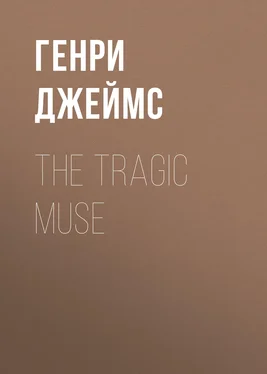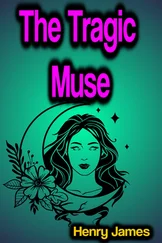Генри Джеймс - The Tragic Muse
Здесь есть возможность читать онлайн «Генри Джеймс - The Tragic Muse» — ознакомительный отрывок электронной книги совершенно бесплатно, а после прочтения отрывка купить полную версию. В некоторых случаях можно слушать аудио, скачать через торрент в формате fb2 и присутствует краткое содержание. Жанр: foreign_antique, foreign_home, cinema_theatre, на английском языке. Описание произведения, (предисловие) а так же отзывы посетителей доступны на портале библиотеки ЛибКат.
- Название:The Tragic Muse
- Автор:
- Жанр:
- Год:неизвестен
- ISBN:нет данных
- Рейтинг книги:5 / 5. Голосов: 1
-
Избранное:Добавить в избранное
- Отзывы:
-
Ваша оценка:
- 100
- 1
- 2
- 3
- 4
- 5
The Tragic Muse: краткое содержание, описание и аннотация
Предлагаем к чтению аннотацию, описание, краткое содержание или предисловие (зависит от того, что написал сам автор книги «The Tragic Muse»). Если вы не нашли необходимую информацию о книге — напишите в комментариях, мы постараемся отыскать её.
The Tragic Muse — читать онлайн ознакомительный отрывок
Ниже представлен текст книги, разбитый по страницам. Система сохранения места последней прочитанной страницы, позволяет с удобством читать онлайн бесплатно книгу «The Tragic Muse», без необходимости каждый раз заново искать на чём Вы остановились. Поставьте закладку, и сможете в любой момент перейти на страницу, на которой закончили чтение.
Интервал:
Закладка:
The late R. L. Stevenson was to write to me, I recall—and precisely on the occasion of The Tragic Muse —that he was at a loss to conceive how one could find an interest in anything so vulgar or pretend to gather fruit in so scrubby an orchard; but the view of a creature of the stage, the view of the "histrionic temperament," as suggestive much less, verily, in respect to the poor stage per se than in respect to "art" at large, affected me in spite of that as justly tenable. An objection of a more pointed order was forced upon me by an acute friend later on and in another connexion: the challenge of one's right, in any pretended show of social realities, to attach to the image of a "public character," a supposed particular celebrity, a range of interest, of intrinsic distinction, greater than any such display of importance on the part of eminent members of the class as we see them about us. There was a nice point if one would—yet only nice enough, after all, to be easily amusing. We shall deal with it later on, however, in a more urgent connexion. What would have worried me much more had it dawned earlier is the light lately thrown by that admirable writer M. Anatole France on the question of any animated view of the histrionic temperament—a light that may well dazzle to distress any ingenuous worker in the same field. In those parts of his brief but inimitable Histoire Comique on which he is most to be congratulated—for there are some that prompt to reserves—he has "done the actress," as well as the actor, done above all the mountebank, the mummer and the cabotin , and mixed them up with the queer theatric air, in a manner that practically warns all other hands off the material for ever. At the same time I think I saw Miriam, and without a sacrifice of truth, that is of the particular glow of verisimilitude I wished her most to benefit by, in a complexity of relations finer than any that appear possible for the gentry of M. Anatole France.
Her relation to Nick Dormer, for instance, was intended as a superior interest—that of being (while perfectly sincere, sincere for her , and therefore perfectly consonant with her impulse perpetually to perform and with her success in performing) the result of a touched imagination, a touched pride for "art," as well as of the charm cast on other sensibilities still. Dormer's relation to herself is a different matter, of which more presently; but the sympathy she, poor young woman, very generously and intelligently offers him where most people have so stinted it, is disclosed largely at the cost of her egotism and her personal pretensions, even though in fact determined by her sense of their together, Nick and she, postponing the "world" to their conception of other and finer decencies. Nick can't on the whole see—for I have represented him as in his day quite sufficiently troubled and anxious—why he should condemn to ugly feebleness his most prized faculty (most prized, at least, by himself) even in order to keep his seat in Parliament, to inherit Mr. Carteret's blessing and money, to gratify his mother and carry out the mission of his father, to marry Julia Dallow in fine, a beautiful imperative woman with a great many thousands a year. It all comes back in the last analysis to the individual vision of decency, the critical as well as the passionate judgement of it under sharp stress; and Nick's vision and judgement, all on the esthetic ground, have beautifully coincided, to Miriam's imagination, with a now fully marked, an inspired and impenitent, choice of her own: so that, other considerations powerfully aiding indeed, she is ready to see their interest all splendidly as one. She is in the uplifted state to which sacrifices and submissions loom large, but loom so just because they must write sympathy, write passion, large. Her measure of what she would be capable of for him—capable, that is, of not asking of him—will depend on what he shall ask of her , but she has no fear of not being able to satisfy him, even to the point of "chucking" for him, if need be, that artistic identity of her own which she has begun to build up. It will all be to the glory, therefore, of their common infatuation with "art": she will doubtless be no less willing to serve his than she was eager to serve her own, purged now of the too great shrillness.
This puts her quite on a different level from that of the vivid monsters of M. France, whose artistic identity is the last thing they wish to chuck—their only dismissal is of all material and social over-draping. Nick Dormer in point of fact asks of Miriam nothing but that she shall remain "awfully interesting to paint"; but that is his relation, which, as I say, is quite a matter by itself. He at any rate, luckily for both of them it may be, doesn't put her to the test: he is so busy with his own case, busy with testing himself and feeling his reality. He has seen himself as giving up precious things for an object, and that object has somehow not been the young woman in question, nor anything very nearly like her. She, on the other hand, has asked everything of Peter Sherringham, who has asked everything of her ; and it is in so doing that she has really most testified for art and invited him to testify. With his professed interest in the theatre—one of those deep subjections that, in men of "taste," the Comédie Française used in old days to conspire for and some such odd and affecting examples of which were to be noted—he yet offers her his hand and an introduction to the very best society if she will leave the stage. The power—and her having the sense of the power—to "shine" in the world is his highest measure of her, the test applied by him to her beautiful human value; just as the manner in which she turns on him is the application of her own standard and touchstone. She is perfectly sure of her own; for—if there were nothing else, and there is much—she has tasted blood, so to speak, in the form of her so prompt and auspicious success with the public, leaving all probations behind (the whole of which, as the book gives it, is too rapid and sudden, though inevitably so: processes, periods, intervals, stages, degrees, connexions, may be easily enough and barely enough named, may be unconvincingly stated, in fiction, to the deep discredit of the writer, but it remains the very deuce to represent them, especially represent them under strong compression and in brief and subordinate terms; and this even though the novelist who doesn't represent, and represent "all the time," is lost, exactly as much lost as the painter who, at his work and given his intention, doesn't paint "all the time").
Turn upon her friend at any rate Miriam does; and one of my main points is missed if it fails to appear that she does so with absolute sincerity and with the cold passion of the high critic who knows, on sight of them together, the more or less dazzling false from the comparatively grey-coloured true. Sherringham's whole profession has been that he rejoices in her as she is, and that the theatre, the organised theatre, will be, as Matthew Arnold was in those very days pronouncing it, irresistible; and it is the promptness with which he sheds his pretended faith as soon as it feels in the air the breath of reality, as soon as it asks of him a proof or a sacrifice, it is this that excites her doubtless sufficiently arrogant scorn. Where is the virtue of his high interest if it has verily never been an interest to speak of and if all it has suddenly to suggest is that, in face of a serious call, it shall be unblushingly relinquished? If he and she together, and her great field and future, and the whole cause they had armed and declared for, have not been serious things they have been base make-believes and trivialities—which is what in fact the homage of society to art always turns out so soon as art presumes not to be vulgar and futile. It is immensely the fashion and immensely edifying to listen to, this homage, while it confines its attention to vanities and frauds; but it knows only terror, feels only horror, the moment that, instead of making all the concessions, art proceeds to ask for a few. Miriam is nothing if not strenuous, and evidently nothing if not "cheeky," where Sherringham is concerned at least: these, in the all-egotistical exhibition to which she is condemned, are the very elements of her figure and the very colours of her portrait. But she is mild and inconsequent for Nick Dormer (who demands of her so little); as if gravely and pityingly embracing the truth that his sacrifice, on the right side, is probably to have very little of her sort of recompense. I must have had it well before me that she was all aware of the small strain a great sacrifice to Nick would cost her—by reason of the strong effect on her of his own superior logic, in which the very intensity of concentration was so to find its account.
Читать дальшеИнтервал:
Закладка:
Похожие книги на «The Tragic Muse»
Представляем Вашему вниманию похожие книги на «The Tragic Muse» списком для выбора. Мы отобрали схожую по названию и смыслу литературу в надежде предоставить читателям больше вариантов отыскать новые, интересные, ещё непрочитанные произведения.
Обсуждение, отзывы о книге «The Tragic Muse» и просто собственные мнения читателей. Оставьте ваши комментарии, напишите, что Вы думаете о произведении, его смысле или главных героях. Укажите что конкретно понравилось, а что нет, и почему Вы так считаете.












